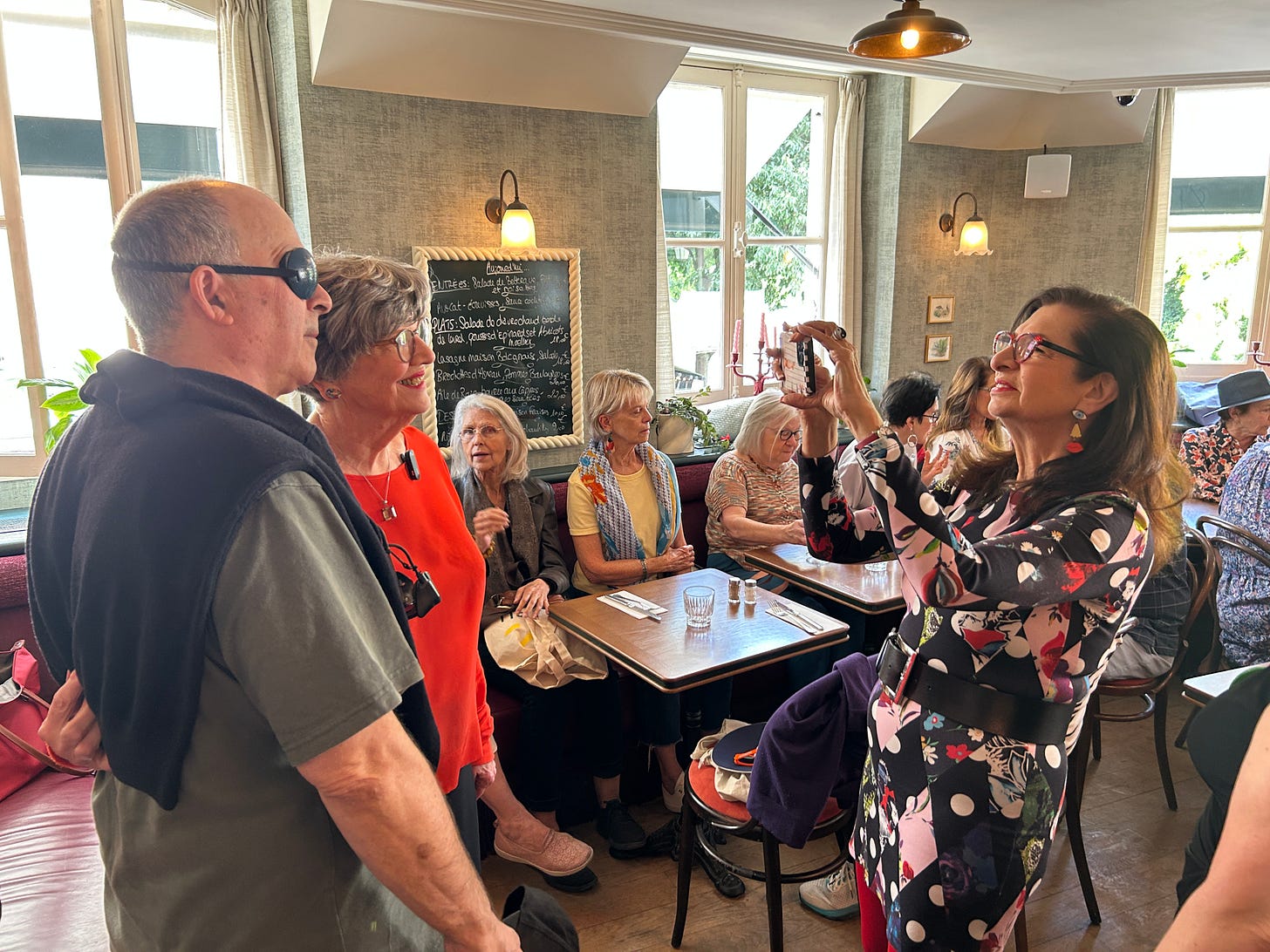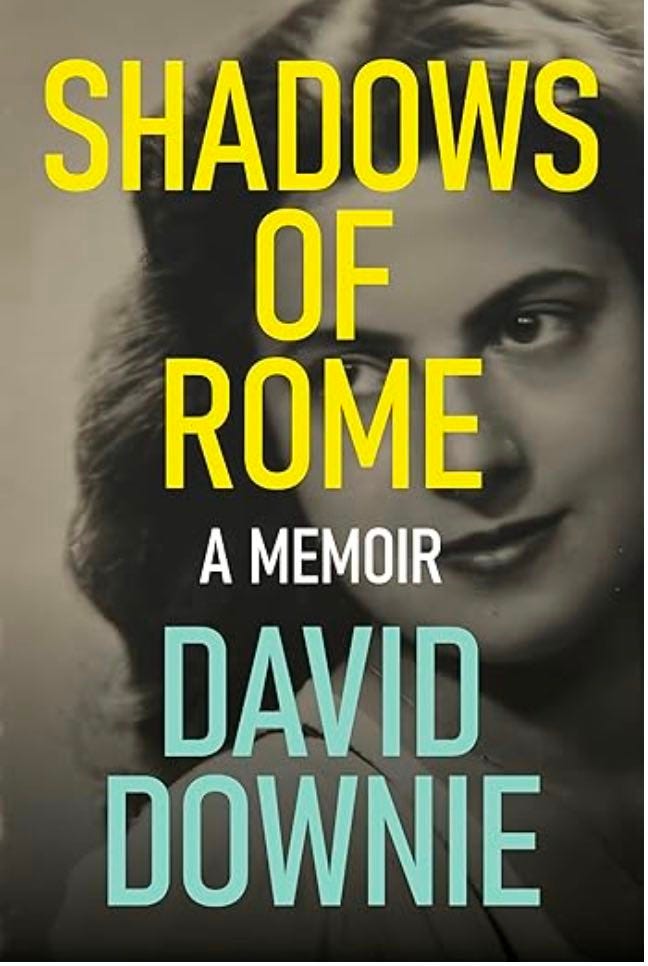David Downie’s Shadows of Rome: A Roman Memoir with Style
His family's origin in postwar Italy, his mother-to-be's close encounter with a P-38, and his father's recoil from the too-heavy influence of the CIA
UPDATE Friday 12 Sept 2025
Earlier this year I reviewed with great pleasure David Downie’s memoir Shadows of Rome. This week I crossed paths with him again on his home turf in Paris, where he presented the book at Adrian Leeds’s monthly Après-Midi gathering of book lovers, expats, and curious anglophones of all stripes.
Adrian drew a full house, as you will see in the photo below. The upstairs meeting room at Café de la Mairie on Rue de Bretagne in the 1st arrondissement was packed—perhaps over-packed, if you looked at it with the gimlet eye of a fire inspector. I listened from a precarious perch on the narrow stairway to a “Privé” door, sharing the spot with Allison Harris, Downie’s wife and a gifted photographer. (She shot the author portraits for all my books and, in my view, still holds the crown for capturing the most memorable portrait of Sophia Loren.)
(Important sidelight: Jan and I met David for breakfast this morning at Le Drop, a café in the 7th near where we take French lessons when we are in town. He brought us a copy of the catalog for Alison's latest exhibit, entitled “Lost Keys, An Italian Journal.” It was shown earlier this year in Milan and is a stunner. (Explore her website. It will be time well spent.)
Adrian, a thirty-year expat from New Orleans who has built a real estate empire in Paris and Nice, turned the event into much more than a standard author talk. She invited Harriet Welty Rochefort—an even longer-term expat, who writes books that seek to bridge the yawning cultural gap between Parisians and their American visitors—to make the introduction. Together Harriet and David settled into the kind of warm, candid conversation about books that only old friends can manage.
You should read both of them. Look at Downie's memoir on this page. Harriet's most recent, Final Transgression: One Woman’s Tragic Destiny in War-torn France, is here. Adrian's video of the entire interview is linked below. My original view of David's memoir is below. (The cover is a grabber; his mother must have been a woman of extraordinary beauty as well as a personality of extraordinary force, as you will see when you read the book.)

Original review of Shadows of Rome (February 2025)
David Downie’s new effort is a true jaunt down memoir lane. It is a hyper-readable tale of his mother, an extroverted Roman teen who ran messages for the Italian resistance; his father, a dispassionate American GI who stayed on after the war to marry her; her complex family in Rome; and the gallery of friends and family she collected in California.
Downie made his mark as a traditionally published writer in the non-fiction world. He then turned to fiction and now is trying his hand (very successfully, in my view) in the tricky land of autobiography. Over the years I've reviewed several of his books and recommend them to you, especially Paris, Paris: Journey into the City of Light, his early love song to the city that became his home.
He was born after the family moved to California at the height of McCarthyism, which forced his mother to renounce her Italian citizenship to avoid affecting her husband’s job on the San Francisco Chronicle.
We first meet Romana Laura Anzi on the streets of Rome. It is 1944 and the Allies are struggling to retake Italy, a campaign that cost them 200,000 casualties. She hasn’t yet met her future husband (how could she? She is dodging a P-38 jockey who is trying to treat her like an arcade game as she goes about carrying Resistance messages).
His father Charles E. Downie was a former Chronicle reporter assigned to signals duty in Rome when he met the dark-eyed teen who, after a courtship of a year and a few months and serious negotiations with Nonno, her father, would become his bride. Nonno is worth a book on his own.
He could stay in Rome because an old friend drafted him to cover sports on Stars & Stripes (rather than shipping out to fight the Japanese), and when that closed he became a founder of the startup Rome Daily American. He stayed there until 1950, when he discovered it was more closely affiliated with the CIA than he found comfortable.
The late 40s were a time of panic on the American political right, much of it McCarthyite over-reaction to the growing left in some European countries. There was a justifiable fear that indigenous communist parties in thrall to Moscow would win postwar elections in Italy and Greece, and to a lesser extent France. The Soviets had rolled up the countries of Eastern Europe, which they kept as tightly controlled satellites until their government collapsed after the Berlin Wall fell.
In any case, Charlie Downie sailed for San Francisco with his wife and young daughter in tow and returned to the Chron. Young David arrived later, but learned little about his father’s wartime adventures—those tales had to come from his mother, an exuberant artist who didn’t fit in at all well with the tea-sipping white-gloved ladies of San Fran in the 50s.
And now he passes them on to us in his distinctive writing style, one that blends skilled wordsmithing with the ability to pack an impressive amount of information on every page.
David moved to Paris with his wife Alison Harris, a noted photographer. They have divided their time between France and Italy for decades.
(I received a publisher's ARC for the initial read, then purchased the book on publication to complete it.)
The following are links to my reviews of some of his books, which I imported into Substack from Wordpress. The text should be easily readable, but some may lack their graphics.
A passion for Paris: https://parttimeparisian.substack.com/p/another-paris-travel-hit-from-david-downie
The Gardener of Eden: https://parttimeparisian.substack.com/p/book-review-the-gardener-of-eden-by-david-downie
Four of Clubs: https://parttimeparisian.substack.com/p/murder-among-friends-in-the-high-sierra
A Taste of Paris: https://parttimeparisian.substack.com/p/flipped-franc-land-something-worth-swallowing
Read and enjoy
John Pearce
Washington, DC
About Après-Midi
Après-Midi is French for afternoon, which is fitting because Adrian's parties start at 3 p.m. An overworked waitress solicits orders for wine and water, and does her best to collect after the show is over. It's a lot of fun, and a good way for friends to renew acquaintance and meet new friends.
This time, Adrian didn't turn out every American expat in town but she got quite a few of them, as you can see in this quick shot of half the crowd from my perch on the stairway. The greenery outside the windows is a block-long parked named for Elie Wiesel.
Watch the video:





Outstanding review, John. Thanks so much. Harriet